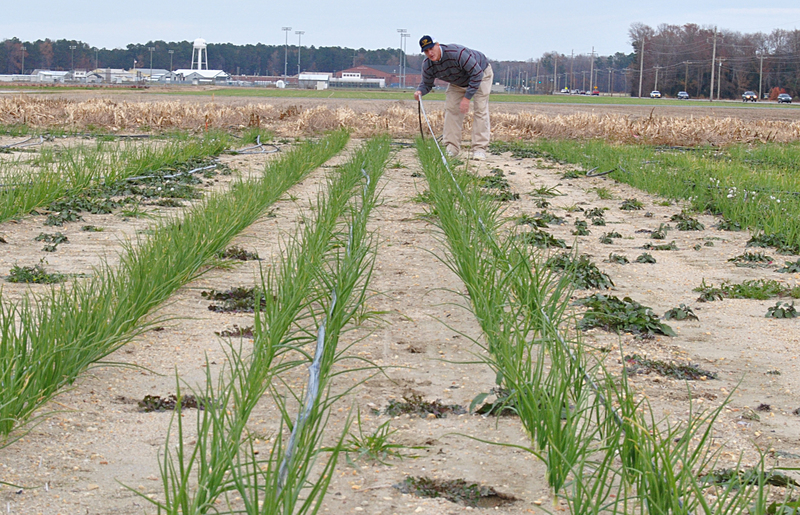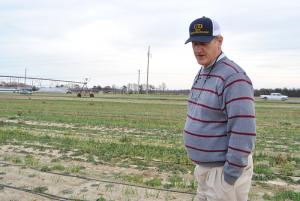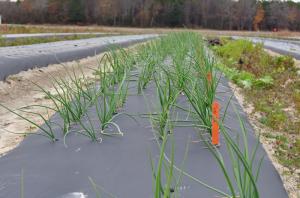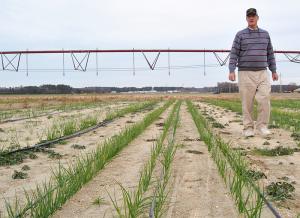The search for a new farming niche
University of Delaware researchers are planting onions with hopes a successful crop will lead to a new niche market for Delaware farmers.
Gordon Johnson, extension specialist for the University of Delaware, said no Delaware farmers are growing onions for market, prompting interest in researching varieties that could be successfully grown in Delaware.
Johnson wants to grow large onions that could be used for onion rings, on salads or in grocery stores’ fresh-cut sections.
If Johnson and researcher Emmalea Ernest are successful, a new onion market could develop for Delaware farmers. The research is funded by $20,000 in federal funds handed out by the state, with an additional $5,000 coming from another grant.
Smaller, bagged onions don’t bring enough profit for small-scale farmers, like the ones likely to grow onions in Delaware, Johnson said.
Major onion-growing states are Texas, Georgia, New York, Michigan, Oregon and Washington, but smaller production groups such as Pennsylvania Sweet have popped up to cash in on shoulder seasons when big onion producers aren’t putting out much of a crop.
Types of onions
While there are many varieties of onions, most fall into two categories – over-winter onions and spring onions. The over-winter type is now being tested at the UD research farm outside Georgetown, while researchers plan to try spring onions starting in May.
Over-winter varieties researchers are testing are Bridger, T-420 and Toughball. These were all chosen for their inherent sweetness and because these varieties are larger onions.
Planted in August, the test onions will be harvested beginning in May, Johnson said. He plans to plant six other varieties of spring onions, which will be harvested in October.
“We have to look at pests and diseases that could be a problem for the onions,” Johnson said. “We also have to look at weeds. The first hard freeze should kill the weeds.”
Over-winter onions grow slowly because of the cold, but as the days get longer, the onions form a bulb. It is important to plant at the right time to allow the onion to grow enough by the time the days get longer. This creates the best and largest onion, Johnson said.
“It’s a very small planting window,” Johnson said. “It seems like there may be only two weeks when the onions should be planted.”
Besides the rows and rows of open-ground onion plantings, Johnson has also planted a bed of transplanted onion plants, which he covered in black plastic.
Pennsylvania onion growers use plastic-covered beds to keep the plants warmer, Johnson said. While labor-intensive, the process could produce better results. He said planting a single bed in plastic took two people most of a day.
Besides the labor required, onion transplants also ramp up the cost for farmers because plants are purchased from other states and shipped to Delaware.
Johnson hopes to get good results in seeded open-ground onions because production costs will be lower.
“Onions can grow on anything, including the type of sandy soil we have here in Delaware,” Johnson said.
He said he foresees a market with Delaware processors who are already in place and working with farmers, but he said more market research will be done in the coming year, once researchers have a better idea of crop yields.
The onion research plot is an acre and a half. Results from similar growing plots in Oregon have produced 40 to 60 tons of onions per acre.
Johnson expects farmers would be interested in devoting about an acre or so to the crop.
He said in 10 years, he hopes there could be upwards of 2,000 acres of onions in Delaware. He said farmers and processors have been interested in onions for years, but no one has taken the risk of planting them without knowing the yields or profits onions could bring.
“If this research is successful, then we will identify markets and promote onions as a new crop to growers,” Johnson said. “That could be three to four years down the line.”
Did you know?
Why are some onions more pungent than others? The pungent smell of an onion is directly related to the soil and fertilizer used to grow it.
The amount and type of fertilizer used on an onion plant determines the onion’s pungency. The more sulfur-based fertilizer used around onion plants creates a more odorous onion. Are your eyes watering yet?
New funding for specialty crops
In the past, not much funding has been available for specialty crops, with most of the grants going to high-yield research. With the passing of the farm bill after 2006, funds through the specialty crop block grant were awarded to specialty crop researchers.
This year, Johnson’s onion research received $20,000 from the state, with an additional $5,000 is being utilized from a separate specialty crop grant.
“Prior to 2006, little money was available for specialty crop research, but the farm bill increased interest and two grant programs were established,” Johnson said.
The state also chose projects to improve cultivation of lima beans and blueberry bushes this year.
























































